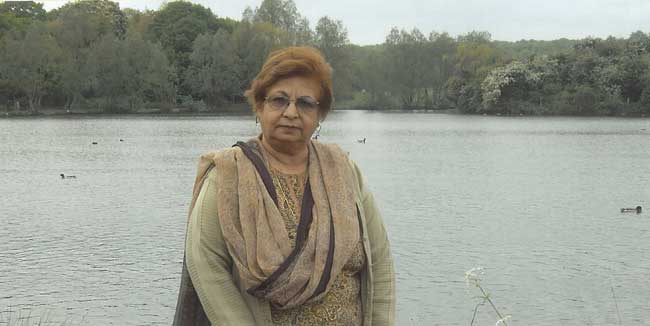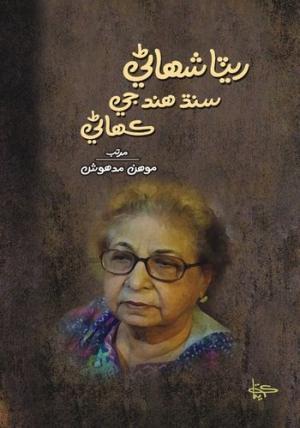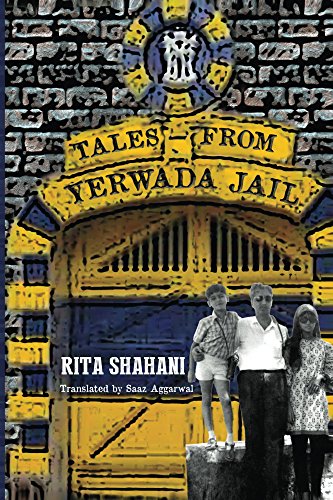
Rita Shahani had 42 books to her credit, written and published since 1979 when she started her career as writer. Her books included short stories, poetry collection, essays, biographies and travelogues.
Despite the fact that our Sindhi community went through a turbulent partition with subsequent migration and relocation; there are a few rare, brave spirits amidst us who rose and shone despite hardships, coming out as winners in the end. Rita Shahani was one such a shining example of the winning spirit of some Sindhis that is exemplary, even historic. Her spirited success story broke the myth of the woman being weaker or lesser than man.
 Rita Shahani created her own unique space in this evergreen garden, flowered and nurtured her creations on the discerning Sindhi readers. Ms. Shahani was not only loved and respected here in India but has created a vast appreciative readership in Sindh as well, where most of her work has also been published and serialized in magazines. Apart from Sindhi, she had a mastery over Hindi, Urdu as well as English languages.
Rita Shahani created her own unique space in this evergreen garden, flowered and nurtured her creations on the discerning Sindhi readers. Ms. Shahani was not only loved and respected here in India but has created a vast appreciative readership in Sindh as well, where most of her work has also been published and serialized in magazines. Apart from Sindhi, she had a mastery over Hindi, Urdu as well as English languages.
Rita Shahani was born on August 24, 1934 in Hyderabad Sindh and migrated to India in 1947 at the tender age of 13.Her family of Zamindars landed in Lucknow where she did her schooling. She got married in 1957 to Vishnu Shahani and moved to Pune.and came to stay in Pune where she continued to stay since then.
She began writing poems at the age of twenty and her paternal uncle the great MU Malkani, who is known as the father of Sindhi literature, encouraged her to keep writing. She had been writing poetry since early age but it was only much later in the 1979 she took her writing seriously and became a full time writer. She wrote novels, essays, poems, travelogues and her autobiography. Her work, prolific as well as proficient, was eagerly awaited by the community. Ms. Shahani had written a lot on Indian spirituality, a line of thinking she had developed over some time. Her series, ROOBAROO, the ENCOUNTER, were highly successful series of biographical stories of the great saints of India like Guru Nanak, Sant Kabir, Meerabai, Osho, Shah Abdul Latif and the living Saint of Sindhis Dada Jashan Vaswani, with whom in her own words, she was in direct touch at a deeper level.

Rita Shahani had been socially active throughout her life. She had been a member of the Board of Studies of the Maharashtra State Board of Secondary and Higher Secondary Education. She worked as Vice-President of the Board of Jai Hind High School, Pimpri for 25 years. She also worked as Secretary of the Pune Women’s Council which is affiliated to the National Council of Women, Delhi. She was a member of National Council for Promotion of Sindhi language. She won many awards including Central Hindi Directorate Award, Narayan Shyam Award, Award from Akhil Bharat Sindhi Boli Sahit Sabha, an award from RJ Advani Trust and a Lifetime Achievement Award from Maharashtra State Sindhi Sahitya Academy, besides two Awards from NCPSL.
Rita Shahani writes, “From Gautam Buddha to Osho, everyone has said and taught the same truth. Aham Brahma See. Vedant said the same Sutra as Ess Dhamo Santano, which Sufis said as Anal Haq. Same was uttered by the Buddha, Kabir, Nanak, Meera. Shah Latif spoke of Alaf and Sachal spoke of the meeting with This and That. It’s the very same truth uttered in different times and different languages, but it means the same thing I Am That.”
Ms. Shahani had been truly successful at presenting hard metaphysical maxims into fairy-tale-like imaginative stories and make them look, sound, taste and feel like the chirping of birds or the sweetness of honey! She was blessed with such an enhancing and expansive vision of life that anyone who comes in contact with her rebellious views is ignited by her liberating spirit.
Literary Achievements
She had 42 books to her credit, written and published since 1979 when she started her career as writer. Her books included short stories, poetry collection, essays, biographies and travelogues. Many of her books had secured prizes from the government bodies and private institutions. Many of her writings have found a place in other modern Indian languages too.
 Her works have been translated into English and other Indian languages.
Her works have been translated into English and other Indian languages.
Some of her books are:
- ‘Pankha Vajaeen Shankha’ (Wings Play Music), Poetry, 1983.
- ‘Piraha Ja Piyaka’ (Early Birds of Dawn), Novel, 1991.
- ‘Sujjan Joon Smrityun’ (Memories of stalwarts), Biography, 1990.
- ‘Bipahri-a-Ja Pal’ (Few Moments of noon), Autobio-graphical Essays, 1995.
- ‘Sawal Ee Sawal’ (Too Many Questions), Short Stories, 1998.
- ‘Bhambhirke Jee Bhun Bhun’ (Whispers of twilight), Poetry, 1985.
‘Bhambhirke Jee Bhun Bhun’ won the award in 1987 at New Delhi by Central Hindi Directorate, Government of India.
Her Short Story Book ‘Sawal-ee- Sawal’ also won the award of National Council for Promotion of Sindhi Language in 2000.
One of the remarkable books of Rita Shahani is ‘Yerwada jail jyun kahaniyoon’, published in 1998. This book was translated in English by a noted writer Saaz Aggawal.
Saaz Aggawal started working with Rita Shahani to translate her book in November 2012. She cannot read Sindhi. Rita read aloud, and they discussed various interpretations until Saaz was sure she knew exactly what Rita wanted to say. There were parts of ‘Yerwada jaila jyu kahaniyoon’ that both felt needed augmenting, and they worked together to source information. By the end of August 2013, the manuscript of English version ‘Tales from Yerwada Jail’ was complete. By a cruel twist of fate, Rita Shahani passed away on 15 September 2013 just a few days after production of this book had started. She never saw it in print.
Rita Shahani, who had a fan following on either side of the India-Pakistan border, breathed her last following a prolonged illness. She was 79.
The book ‘Yerwada jaila jyu kahaniyoon’ is based on prison life of Rita Shahani’s husband Vishnu Shahani who was a freedom fighter.
“At bedtime every night, Vishnu Shahani’s two young children refused to sleep until he tells them a story from his time in jail. Vishnu’s stories embody a spirit of adventure, and the youthful excitement of overcoming a powerful and oppressive enemy. He speaks of personal involvement in the Indian freedom struggle, without a trace of complaint against the hardship he faced,” Rita had stated about the book.
After Vishnu’s death, Rita, interviewed others to get a fuller picture. She found that the perception of each participant in the family’s history varies slightly. She pieced the versions together, allowing the differing interpretations to coexist.
Through the story of the Shahani family, this book honors the struggle and sacrifice of thousands of ordinary families in the 1940s.
Tales from Yerwada Jail also tells of the little-known contribution of the Sindhis to Independence, and their struggle to find livelihood and new homes after Partition.
Written for readers of all ages, this book serves as a reminder of important facts we have too easily forgotten, and also shows some of the challenges of recording history.
Secular Sanghi
On this day in 1997, Vishnu Shahani died. His widow, Rita Shahani, would write: He had not been ill. There was no warning. No intimation. There was no goodbye. When I woke up that morning, he was gone.
Years later, I worked with Rita to bring out an English translation of the (Sindhi) book she wrote after Vishnu’s death. As we got the book ready for press, Rita died. It was a shock. Her daughter, my dear friend Madhavi Kapur, launched the book a few days later on 23 November 2013, a tribute to both her parents Rita and Vishnu.
Tragically, less than six months ago, we lost Madhavi too. For many of us, the pain of that loss will always remain.
Madhavi resembled her father Vishnu in many ways, specifically in her strong principles and commitment to social welfare. At the core of Vishnu’s identity was his commitment to Hinduism. Today the Rashtriya Seva Sangh (RSS) is perceived as a fundamentalist organization: inflexible, chauvinistic and with a capacity for violence. Vishnu, a dedicated Sanghi, was open, caring and devoted only to truth and the betterment of humankind.
While Madhavi’s biggest contribution is in education and she is remembered with love and gratitude by her thousands of pupils, she is also well known for her unwavering stand towards secularism in India. On one occasion, she took a Pune housing society to court because they refused to accept a Muslim neighbor. She won the case, the Muslim family moved in to the building – and very soon they were accepted by their neighbors and integrated.
________________________
Source: Sindhi Shan, The Song Bird, The Pune Mirror, Amazon, Black and White Fountain, Sindhi Sangat, Indian Express, Sindhi Shan
